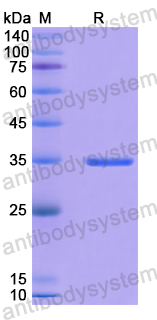Catalog No.
YHG96501
Expression system
E. coli
Species
Homo sapiens (Human)
Protein length
Glu471-Pro526
Predicted molecular weight
34.79 kDa
Nature
Recombinant
Endotoxin level
Please contact with the lab for this information.
Purity
>90% as determined by SDS-PAGE.
Accession
Q15003
Applications
ELISA, Immunogen, SDS-PAGE, WB, Bioactivity testing in progress
Form
Lyophilized
Storage buffer
Lyophilized from a solution in PBS pH 7.4, 0.02% NLS, 1mM EDTA, 4% Trehalose, 1% Mannitol.
Reconstitution
Reconstitute in sterile water for a stock solution. A copy of datasheet will be provided with the products, please refer to it for details.
Shipping
In general, proteins are provided as lyophilized powder/frozen liquid. They are shipped out with dry ice/blue ice unless customers require otherwise.
Stability and Storage
Use a manual defrost freezer and avoid repeated freeze thaw cycles. Store at 2 to 8°C for frequent use. Store at -20 to -80°C for twelve months from the date of receipt.
Alternative Names
CAPH, BRRN1, hCAP-H, Barren homolog protein 1, XCAP-H homolog, Non-SMC condensin I complex subunit H, BRRN, Chromosome-associated protein H, NCAPH, Condensin complex subunit 2, KIAA0074
A comprehensive review and in silico analysis of the role of survivin (BIRC5) in hepatocellular carcinoma hallmarks: A step toward precision., PMID:40306500
NCAPH promotes glucose metabolism reprogramming and cell stemness in ovarian cancer cells through the MEK/ERK/PD-L1 pathway., PMID:40259316
NCAPH Promotes the Proliferation of Prostate Cancer Cells Via Modulating the E2F1 Mediated PI3K/AKT/mTOR Axis., PMID:39991770
Molecular mechanism of condensin I activation by KIF4A., PMID:39690239
circEIF3I Promotes Colorectal Cancer Metastasis by Regulating the miR-328-3p/NCAPH Axis., PMID:39620395
Enhancing risk stratification models in localized prostate cancer by novel validated tissue biomarkers., PMID:39543244
NCAPH, ubiquitinated by TRIM21, promotes cell proliferation by inhibiting autophagy of cervical cancer through AKT/mTOR dependent signaling., PMID:39103348
Unveiling the Significance of NCAP Family Genes in Adrenocortical Carcinoma and Adenoma Pathogenesis: A Molecular Bioinformatics Exploration., PMID:39045040
The role of NCAPH in cancer treatment., PMID:38901722
Integrated bioinformatics combined with machine learning to analyze shared biomarkers and pathways in psoriasis and cervical squamous cell carcinoma., PMID:38863714
MiR-1976/NCAPH/P65 axis inhibits the malignant phenotypes of lung adenocarcinoma., PMID:38755247
NCAPH serves as a prognostic factor and promotes the tumor progression in glioma through PI3K/AKT signaling pathway., PMID:38587786
Bioinformatics-based screening and analysis of the key genes involved in the influence of antiangiogenesis on myeloid-derived suppressor cells and their effects on the immune microenvironment., PMID:38526604
NCAPH drives breast cancer progression and identifies a gene signature that predicts luminal a tumour recurrence., PMID:38344872
Identification of renal ischemia reperfusion injury-characteristic genes, pathways and immunological micro-environment features through bioinformatics approaches., PMID:38329418
Origin recognition complex subunit 1(ORC1) is a potential biomarker and therapeutic target in cancer., PMID:37833711
A systematic approach identifies p53-DREAM pathway target genes associated with blood or brain abnormalities., PMID:37661832
LncRNA landscape and associated ceRNA network in placental villus of unexplained recurrent spontaneous abortion., PMID:37340405
FOXM1/NCAPH activates glycolysis to promote colon adenocarcinoma stemness and 5-FU resistance., PMID:37260271
Identification of Prognostic Markers of DNA Damage and Oxidative Stress in Diagnosing Papillary Renal Cell Carcinoma Based on High-Throughput Bioinformatics Screening., PMID:36785669
YAP-mediated mechanotransduction in urinary bladder remodeling: Based on RNA-seq and CUT&Tag., PMID:36741311
An integrative pan-cancer analysis reveals the carcinogenic effects of NCAPH in human cancer., PMID:36650758
NCAPH Stabilizes GEN1 in Chromatin to Resolve Ultra-Fine DNA Bridges and Maintain Chromosome Stability., PMID:36380731
Identification of Prognostic Markers and Potential Therapeutic Targets in Gastric Adenocarcinoma by Machine Learning Based on mRNAsi Index., PMID:36213825
Non-SMC condensin I complex subunit H promotes the malignant progression and cisplatin resistance of breast cancer MCF-7 cells., PMID:35949592
Identification and characterization of sex-dependent gene expression profile in glioblastoma., PMID:35789505
NCAPH is a prognostic biomarker and associated with immune infiltrates in lung adenocarcinoma., PMID:35688915
Identification of hub genes and biological pathways in glioma via integrated bioinformatics analysis., PMID:35676807
UBE2T is a prognostic biomarker and correlated with Th2 cell infiltrates in retinoblastoma., PMID:35594577
NCAPH promotes cell proliferation and inhibits cell apoptosis of bladder cancer cells through MEK/ERK signaling pathway., PMID:34974790
NCAPH regulates gastric cancer progression through DNA damage response., PMID:34962823
Evaluation of the OsTIR1 and AtAFB2 AID Systems for Genome Architectural Protein Degradation in Mammalian Cells., PMID:34805274
OCT1 Is a Poor Prognostic Factor for Breast Cancer Patients and Promotes Cell Proliferation via Inducing NCAPH., PMID:34768935
Expression and Clinical Significance of the NCAPH, AGGF1, and FOXC2 Proteins in Serous Ovarian Cancer., PMID:34584452
A transcription factor that promotes proliferation, migration, invasion, and epithelial-mesenchymal transition of ovarian cancer cells and its possible mechanisms., PMID:34399777
miR-133b targets NCAPH to promote β-catenin degradation and reduce cancer stem cell maintenance in non-small cell lung cancer., PMID:34230450
Comprehensive Analysis of the Control of Cancer Stem Cell Characteristics in Endometrial Cancer by Network Analysis., PMID:33859719
HPV E7-mediated NCAPH ectopic expression regulates the carcinogenesis of cervical carcinoma via PI3K/AKT/SGK pathway., PMID:33311486
Non-SMC condensin I complex subunit H (NCAPH), a regulator of cell cycle, predicts poor prognosis in lung adenocarcinoma patients: a study mainly based on TCGA and GEO database., PMID:35117357
Prognostic Prediction Using a Stemness Index-Related Signature in a Cohort of Gastric Cancer., PMID:33134315
Identification of NCAPH as a biomarker for prognosis of breast cancer., PMID:33009967
Comprehensive analysis of transcriptome data stemness indices identifies key genes for controlling cancer stem cell characteristics in gastric cancer., PMID:35117216
NCAPH is negatively associated with Mcl‑1 in non‑small cell lung cancer., PMID:32945371
NCAPH is upregulated in endometrial cancer and associated with poor clinicopathologic characteristics., PMID:32628282
NCAPH Is Required for Proliferation, Migration and Invasion of Non-small-cell Lung Cancer Cells., PMID:32487618
Overexpression of MYBL2 promotes proliferation and migration of non-small-cell lung cancer via upregulating NCAPH., PMID:32200471
Non-SMC condensin I complex subunit H mediates mature chromosome condensation and DNA damage in pancreatic cancer cells., PMID:31784646
Non-SMC condensin I complex subunit H enhances proliferation, migration, and invasion of hepatocellular carcinoma., PMID:31523845
Overexpression of NCAPH is upregulated and predicts a poor prognosis in prostate cancer., PMID:31186803
Identification and validation of key genes associated with non-small-cell lung cancer., PMID:31127628

